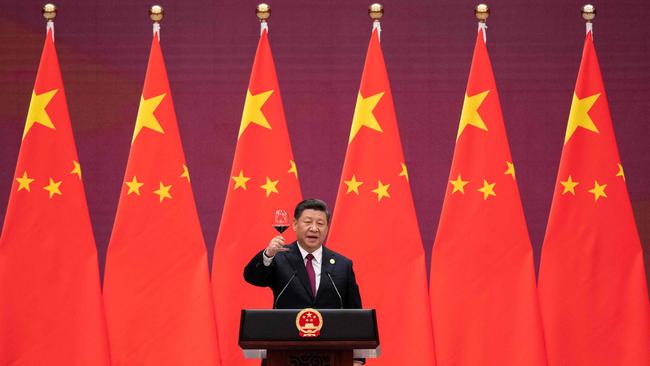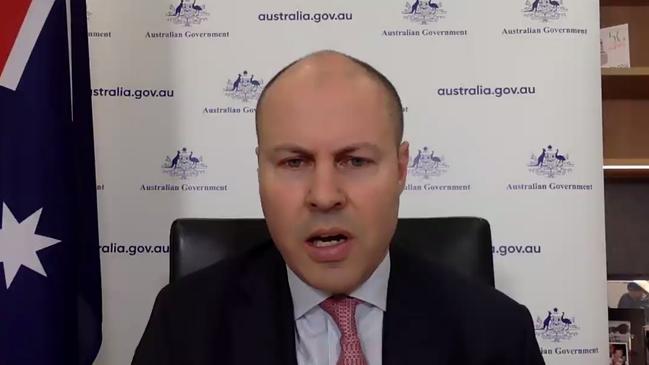Josh Frydenberg urges Australian businesses to adopt ‘China plus’ strategy against economic coercion
Treasurer Josh Frydenberg has outlined Australia’s ‘China plus’ strategy to counter the trade giant’s ‘economic coercion’.
Economy
Don't miss out on the headlines from Economy. Followed categories will be added to My News.
Australia has underlined its plan to tackle China’s “economic coercion” amid a new era of strategic competition.
Treasurer Josh Frydenberg told the ANU Crawford Leadership Forum on Monday that “it is no secret that China has recently sought to target Australia’s economy”.
“They have targeted our agricultural and resources sector, with measures affecting a range of
products, including wine, seafood, barley and coal,” Mr Frydenberg said in an appearance via Zoom.
In taking this action, Mr Frydenberg said China had cited 14 “so-called ‘grievances’, covering everything from our foreign investment laws to our willingness to call out cyber-attacks”.
“We have faced increasing pressure to compromise on our core values,” he said.
“And when we have stood firm, as we always will, we have been subjected to economic
coercion.”
Mr Frydenberg said “there can be no doubt that strategic competition is back” and this would see Australia’s economic and security interests increasingly overlap.
He has urged businesses to adopt a “China plus” approach to markets.
While Australia has faced strategic competition before, including during the Cold War, Mr Frydenberg said China’s trade influence created more challenges.

He said during the Cold War, the Soviet Union was largely cut off from the rest of the world and did not trade or invest much outside of its sphere of influence.
It’s a very different situation when it comes to China, whose global gross domestic product (GDP) is expected to increase to 18.8 per cent in 2021, according to the International Monetary Fund (IMF).
“China became the world’s largest exporter of goods in 2009,” Mr Frydenberg said.
“And by 2019, it accounted for over 13 per cent of global exports.”
He said when China joined the World Trade Organisation in 2001, more than 80 per cent of
countries had a larger volume of trade with the US than with China.
By 2018, this figure had come down to only 30 per cent.
“Almost 130 countries now have China as their largest trading partner,” he said.
“This combination of economic weight, global integration and assertiveness poses new and
significant challenges for many countries around the world.
“Australia is facing this pressure more sharply than most other countries.”
Mr Frydenberg said it was a very different global environment to that faced by recent Australian Governments.

He noted that China’s growing economic weight had helped lift more than 800 million people out of poverty, contributed to global economic growth and prosperity.
“But more recently, it has also been defined by another feature,” he said.
“A more confident and assertive China.
“A China that is willing to use its economic weight as a source of political pressure.
“It offers economic ‘carrots’ through initiatives such as the Belt and Road and it threatens economic consequences for perceived misdeeds.”
Australia’s ‘surprising’ resilience
However, Mr Frydenberg said Australia’s economy had also proven to be remarkably resilient and had continued to perform very strongly.
“I am not downplaying the impact of China’s actions,” he said.
“They have hurt specific industries and regions, significantly in some cases.
“Nevertheless, the overall impact on our economy has, to date, been relatively modest.
“This is perhaps surprising to many.”
Mr Frydenberg said many of the firms and industries targeted by China’s trade restrictions had pivoted and had found new buyers for their goods.
“Of those goods targeted by trade actions, our total exports to China are estimated to have
fallen by around $5.4 billion over the year to the June quarter,” he said.
“But over the same period, exports of those goods to the rest of the world have increased by
$4.4 billion.”
He said Australian coal that would have gone to China, has found buyers in India, South Korea and Taiwan.
“Over the past year, our coal exports to China have fallen by around 30 million tonnes but our coal exports to the rest of the world have risen by 28 million tonnes,” he said.
Barley has been redirected to new markets such as Saudi Arabia, which previously did not buy this from Australia.
“Overall Australian barley export tonnage was up by almost 70 per cent to the June quarter and Saudi Arabia accounted for over 22 per cent of our total Bali export volumes, up from nothing in the June quarter last year.
“Australian wine producers are also looking to redirect, more of their products to alternative markets, such as the UK, Singapore, and Germany, and South Korea.”
Australia’s ‘China plus’ strategy
Mr Frydenberg said that many Australian businesses had worked hard to access the lucrative Chinese market and they should continue to purse these opportunities where they could.
“But going forward, businesses also need to be aware that the world has changed,” he said.
“In this respect, they should always be looking to diversify their markets, and not overly rely
on any one country. Essentially adopting a ‘China plus’ strategy.”
In the same way that governments were investing in economic resilience, Mr Frydenberg said Australian businesses should as well — looking at everything from cyber risks to supply chains and everything in between.
He said the Morrison Government is taking steps to strengthen the resilience of the economy by supporting businesses to diversify and adapt, and by securing critical economic systems and industries.
This includes providing $72 million to help farmers diversify and open new markets, and reforming the export market development grants program that helps about 4000 small and medium businesses every year.
“The government will reimburse up to half of all international marketing and promotional expenditure, up to $150,000 per business each financial year,” he said.
“And we’re defending the interests of our barley and wine exporters in the WTO, and will continue to support our manufacturing sector to access global markets and build more sovereign capability in the areas of critical need.”
He said a $1.3 billion manufacturing program would support businesses to scale up, translate ideas into commercial opportunities and integrate into international supply chains.
“This assistance, empowers individual businesses and strengthens our economy overall, also helps to forge new partnerships like minded countries around the world to further strengthen the resilience of our critical supply chains.”
He said the government was also committed to securing critical infrastructure in areas such as energy, telecommunications, and transport, including through combating cybercrime and applying a national security test for foreign investors.
“The Morrison Government is taking active steps to bolster our economic resilience and so too should business,” he said.
“Not just for the short term, but the long term as well. This is a responsibility we all need to take very seriously.”
Mr Frydenberg said Australia would choose partnerships ahead of conflict, wherever it could.
“However, heightened strategic competition is the new reality we face,” he said.
He said the task was now to prepare for and manage this competition.
“In this new world, economic resilience is key,” he said.
“Key to our strategic interests and key to our economic interests.”
Originally published as Josh Frydenberg urges Australian businesses to adopt ‘China plus’ strategy against economic coercion



